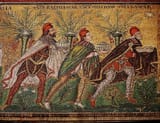Search Results
7/9/2025, 10:42:08 AM
>>509904444
>As Yamauchi describes, “the relationship of the Magi to Zoroaster and his teachings is a complex and controversial issue.” Ever since the early days of the Achaemenid empire, there had existed an antagonism with the proponents of true Zoroastrianism and the Magi. Essentially, when the Persians conquered Babylon, the Magi had come into contact with the Chaldeans, whose beliefs and teachings they introduced into their version of Zoroastrians. Therefore, as long as the Persian empire lasted, there was always a distinction between the Persian Magi, the official priestly caste, and the Babylonian Magi, who were often considered to be outright impostors. From the time of Xerxes however, they began to receive increasing favour at court, until the title of Magi eventually lost its heretical connotations. As the French Assyriologist Lenormant noted, “to their influence are to be ascribed nearly all the changes which, towards the end of the Achaemenid dynasty, corrupted deeply the Zoroastrian faith, so that it passed into idolatry.”
>From the fourth century BC on, the Magi were increasingly associated with the Chaldeans as sorcerers and astrologers. The Greek and Latin words for magic, mageia and magia was originally derived in reference to the supposed arts the Magi. As a reflection of this reputation, a Hippocratic treatise from the late fifth century BC, declares that the Magi are the sort of persons who “profess to know how to bring down the moon, to eclipse the sun, to make storm and sunshine, rain and drought, the sea impassable and the earth barren.” Through the association of Zoroastrianism with the Magi, Zoroaster became renowned as a great sage, and numerous pseudepigraphical books on religion, magic and astrology were ascribed to him. The Greeks saw in Zoroaster’s name the word “star,” and it was explained by Hermodorus, a pupil of Plato, as meaning “star worshipper.”
>As Yamauchi describes, “the relationship of the Magi to Zoroaster and his teachings is a complex and controversial issue.” Ever since the early days of the Achaemenid empire, there had existed an antagonism with the proponents of true Zoroastrianism and the Magi. Essentially, when the Persians conquered Babylon, the Magi had come into contact with the Chaldeans, whose beliefs and teachings they introduced into their version of Zoroastrians. Therefore, as long as the Persian empire lasted, there was always a distinction between the Persian Magi, the official priestly caste, and the Babylonian Magi, who were often considered to be outright impostors. From the time of Xerxes however, they began to receive increasing favour at court, until the title of Magi eventually lost its heretical connotations. As the French Assyriologist Lenormant noted, “to their influence are to be ascribed nearly all the changes which, towards the end of the Achaemenid dynasty, corrupted deeply the Zoroastrian faith, so that it passed into idolatry.”
>From the fourth century BC on, the Magi were increasingly associated with the Chaldeans as sorcerers and astrologers. The Greek and Latin words for magic, mageia and magia was originally derived in reference to the supposed arts the Magi. As a reflection of this reputation, a Hippocratic treatise from the late fifth century BC, declares that the Magi are the sort of persons who “profess to know how to bring down the moon, to eclipse the sun, to make storm and sunshine, rain and drought, the sea impassable and the earth barren.” Through the association of Zoroastrianism with the Magi, Zoroaster became renowned as a great sage, and numerous pseudepigraphical books on religion, magic and astrology were ascribed to him. The Greeks saw in Zoroaster’s name the word “star,” and it was explained by Hermodorus, a pupil of Plato, as meaning “star worshipper.”
Page 1
